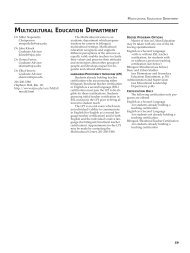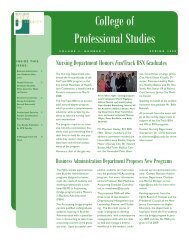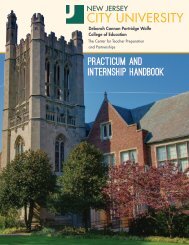Undergraduate Catalog - New Jersey City University
Undergraduate Catalog - New Jersey City University
Undergraduate Catalog - New Jersey City University
You also want an ePaper? Increase the reach of your titles
YUMPU automatically turns print PDFs into web optimized ePapers that Google loves.
40 UNDERGRADUATE CATALOG 2011-2014 NEW JERSEY CITY UNIVERSITY<br />
unadministered test;<br />
Altering test answers and then claiming<br />
instructor inappropriately graded the<br />
examination;<br />
Unauthorized collaboration with any<br />
other person in preparing work offered for<br />
credit (e.g., purchased term papers*).<br />
*NJSA 18A: 2-3 (c) prohibits the preparation<br />
for sale of any term paper, thesis,<br />
dissertation, essay, report or other written,<br />
recorded, pictorial, artistic or other assignment<br />
knowing that it is intended to fulfill<br />
requirements for a degree, diploma, certificate<br />
or course at any educational institution.<br />
The law specifies up to a $1,000 fine<br />
for violations of its provisions.<br />
Penalties of Violations for<br />
Academic Integrity<br />
Level I<br />
Level I penalties apply in circumstances<br />
involving ignorance or inexperience on the<br />
part of the person(s) committing the violation<br />
and ordinarily include a minor portion<br />
of the course work. The imposition of these<br />
penalties is considered an academic issue<br />
and not disciplinary.<br />
Example: Improper documentation of<br />
sources or unauthorized collaboration<br />
on an academic exercise.<br />
Possible Penalties: Make-up assignment,<br />
assignment of no-credit for the work in<br />
question, or a required assignment on<br />
preparation of term papers.<br />
These penalties are subject to the discretion<br />
of the faculty member. Faculty will meet<br />
with the student offender to discuss the<br />
allegation and possible penalties.<br />
Level II<br />
Level II penalties involve incidents of a<br />
more serious nature and affect a significant<br />
aspect or portion of the course.<br />
Example: Copying from or giving assistance<br />
to others on a mid-term, final<br />
or other examination; plagiarizing major<br />
portions of an assignment; using unauthorized<br />
material on an examination;<br />
or altering a graded examination for the<br />
purposes of re-grading.<br />
Possible penalties: A failing grade on<br />
the assignment and/or in the course,<br />
which ever is applicable, may be given<br />
subject to the discretion of the faculty<br />
member. Violations at this level will be<br />
reported to the department chair and<br />
the Academic Dean (for major courses,<br />
the report will be made to the corresponding<br />
Academic Dean, for general<br />
studies courses, the report will be made<br />
to the Dean of Arts and Sciences, in the<br />
case of an undergraduate student). A<br />
notation of plagiarism shall be placed<br />
in the student’s record following this<br />
offense, and the student will not be<br />
allowed to expunge the grade of F from<br />
his/her GPA should he or she re-take<br />
the course. Confidential copies of<br />
the report will also be sent to the Vice<br />
President for Academic Affairs and the<br />
Dean of Students or the Dean of Graduate<br />
and Continuing Education. Should<br />
the Vice President for Academic Affairs<br />
upon receipt of a report of plagiarism,<br />
find that a student has a prior record of<br />
plagiarism, the offense will be upgraded<br />
to Level III, and the Vice President for<br />
Academic Affairs will notify the instructor,<br />
the chair and the academic dean so<br />
that appropriate action can be taken.<br />
Any violation that involves repeat offenses<br />
at Level I is considered a Level III<br />
violation.<br />
Level III<br />
Level III penalties apply to offenses that<br />
are even more serious in nature and involve<br />
pervasive dishonesty on a significant portion<br />
of course work, such as a major paper,<br />
mid-term, final exam or other examination.<br />
Example: Using a purchased term paper<br />
presenting the work of another as<br />
one’s own; having a substitute take an<br />
examination; or possessing or obtaining<br />
an examination without the professor’s<br />
authority or prior knowledge.<br />
Possible Penalties: A failing grade on<br />
the assignment and/or in the course,<br />
which ever is applicable, may be given<br />
subject to the discretion of the instructor.<br />
Violations at this level will be<br />
reported to the department chair and<br />
the academic dean (for major courses,<br />
the report will be made to the corresponding<br />
Academic Dean, for general<br />
studies courses, the report will be made<br />
to the Dean of Arts and Sciences). In<br />
the case of an undergraduate student,<br />
a notation of plagiarism shall be placed<br />
in the student’s record following this<br />
offense, and the student will not be<br />
allowed to expunge the grade of F from<br />
his/her GPA should he or she re-take the<br />
course. Confidential copies of the report<br />
will also be sent to the Vice President<br />
for Academic Affairs and the Dean of<br />
Students or the Dean of Graduate and<br />
Continuing Education. Should the Vice<br />
President for Academic Affairs or the<br />
Dean of Graduate and Continuing Education<br />
discover, upon receipt of a report<br />
of plagiarism, that a student has a prior<br />
record of plagiarism, the Vice President<br />
for Academic Affairs or the Dean of<br />
Graduate and Continuing Education<br />
will notify the faculty member, the chair<br />
and the academic dean so that appropriate<br />
action can be taken.<br />
In the event the faculty member determines<br />
that the violation is severe, she/he<br />
may recommend to the department chair/<br />
academic dean that the student be placed<br />
on probation, suspension, or expulsion<br />
for one or more semesters with a notation<br />
of “disciplinary suspension” indicated on<br />
the student’s record, or that the student be<br />
permanently dismissed from the <strong>University</strong><br />
in case of repeat offenses. The Academic<br />
Dean, in consultation with the faculty<br />
member, will be responsible for deciding<br />
the additional penalty.<br />
Academic Grievance/<br />
Appeal Procedure<br />
The following procedure is available to<br />
resolve grievances regarding grading,<br />
course requirements, attendance, academic<br />
integrity, and other academically related<br />
complaints:<br />
Step 1. Meeting and discussion with the<br />
faculty member involved to resolve the<br />
situation in question must take place within<br />
forty-five (45) days of the last day of the<br />
semester on which the grievance is based.<br />
At the conclusion of the meeting the faculty<br />
member will inform the student of a decision.<br />
Step 2. The student may initiate a written<br />
appeal with the faculty member within ten<br />
(10) calendar days of notification of the<br />
decision of the faculty member; the faculty<br />
member will respond in writing within ten<br />
(10) calendar days of the date of receipt<br />
of the written appeal. Should the faculty<br />
member fail to respond within ten (10) calendar<br />
days, the student may present his/her<br />
written appeal to the next level of review,<br />
the department chairperson, within ten (10)<br />
calendar days.<br />
Step 3. Written appeal to the appropriate<br />
department chairperson within ten (10)<br />
calendar days of notification of a decision<br />
pursuant to the previous step or upon failure<br />
of the faculty member to respond with



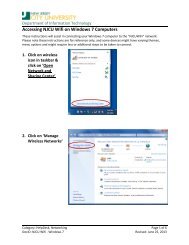
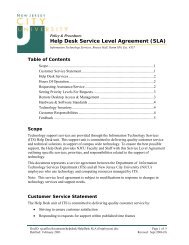

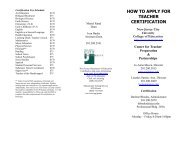

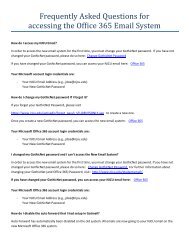
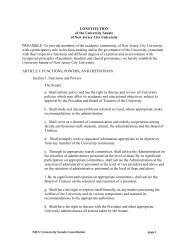
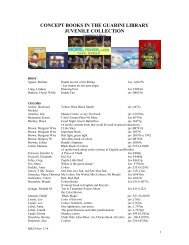
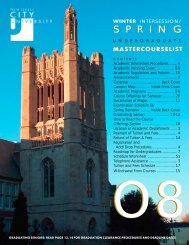
![UACHS 9th English Unit- Feed[1] - New Jersey City University](https://img.yumpu.com/46563190/1/190x245/uachs-9th-english-unit-feed1-new-jersey-city-university.jpg?quality=85)
